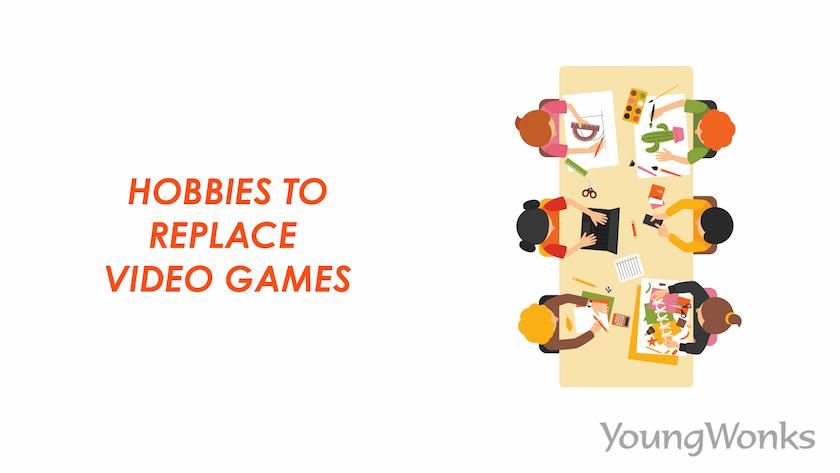Dec 23, 2024 By Team YoungWonks *
Why Replace Video Games?
Video game addiction is a real issue for many gamers. The constant stimulation, dopamine hits, and competition in games like League of Legends, Fortnite, and World of Warcraft (WoW) can make real world activities seem dull in comparison. However, stepping away from excessive gaming can improve mental and physical health, strengthen relationships, and introduce fundamentals that benefit you in real life.
Finding a New Hobby
The key to replacing video games is to find a new hobby that stimulates your mind, provides challenges, and offers satisfaction. A good replacement hobby should be engaging, rewarding, and provide opportunities for personal growth.
Engaging Hobbies to Replace Video Games
- Board Games and RPGs: If you love strategy and storytelling in games like WoW and FPS titles, then board games and role-playing games (RPGs) can be great alternatives. Many RPGs, like Dungeons & Dragons, allow you to explore creativity, problem-solving, and teamwork without sitting in front of a screen for hours.
- Reading Books and Podcasts: Gaming often appeals to people who love immersive worlds and storytelling. Reading books or listening to podcasts about fantasy, sci-fi, or history can give you the same sense of adventure. Reading also improves concentration, vocabulary, and creativity.
- Martial Arts and Self-Defense: If you enjoy the action and skill-building of video games, martial arts can be a great way to get active. Learning martial arts helps with discipline, focus, and self-defense. It also provides a great way to meet new friends while improving fitness.
- Outdoor Activities: Rock Climbing, Rafting, and More: Instead of spending a lot of time in front of a screen, try outdoor activities like rock climbing, rafting, and hiking. These activities provide real-world excitement, test physical endurance, and offer rewarding experiences that gaming simply can’t match.
- Creative Arts: Drawing, Painting, and Writing: If you love the artistic aspects of anime or video game design, you might enjoy drawing, painting, or creative writing. These hobbies allow you to create your own worlds instead of exploring digital ones. Many artists have been passionate about drawing since they were just a few years old, and this passion can grow into a fulfilling career.
- Music and Instrument Playing: Gaming often involves great soundtracks and rhythm-based challenges. Learning an instrument like the guitar, piano, or drums can provide the same sense of progression and skill mastery as a video game.
- Fitness and Sports: A common downside of gaming is a sedentary lifestyle. Trying new sports, like basketball, soccer, or even rock climbing, is a great way to stay fit while still enjoying competition and teamwork.
- Volunteering and Community Involvement: Many gamers seek purpose and achievement in games. Helping out in your local community or joining a charity project can provide a real sense of fulfillment that no video game can offer.
- Learning New Skills and Personal Development: If you’ve spent years playing video games, imagine what you could achieve by dedicating that time to learning new skills. Whether it’s coding, woodworking, cooking, or learning a new language, personal development can be both fun and rewarding.
- Exploring Netflix and Anime in a Balanced Way: While watching Netflix and anime isn't as interactive as gaming, it can be a relaxing way to enjoy a good story without the addictive competition that many video games encourage.
Overcoming the Gaming Habit
- Set Clear Goals: Define why you want to cut back on gaming. Whether it’s to improve your health, build new relationships, or develop new skills, having a clear reason will help keep you motivated.
- Reduce Game Time Gradually: Instead of quitting cold turkey, start by decreasing the amount of time you spend gaming each day and replace it with a new activity.
- Find a Supportive Community: Forums like Game Quitters and Reddit have communities of people looking to replace gaming with productive hobbies. Engaging with these groups can provide motivation and new hobby ideas.
- Reward Yourself for Progress: Video games provide instant gratification, so replacing them with hobbies that offer delayed rewards can be challenging. Set up small rewards for achieving milestones in your new activities.
- Address Underlying Issues: For some people, gaming is an escape from real-life stress. Addressing issues like anxiety, boredom, or social isolation can make it easier to step away from excessive gaming.
Conclusion
Replacing video games with fulfilling real-world activities can be one of the best decisions you make. Whether you’re drawn to board games, outdoor adventures, martial arts, creative pursuits, or fitness, there are countless ways to spend your free time productively. The key is to start small, experiment with different hobbies, and find something that brings you joy and fulfillment. While gaming isn’t inherently bad, balancing it with other aspects of life can lead to a healthier and more rewarding lifestyle. If gaming has taken up too much of your time in the first place, now is the best time to make a change!.
Many people start gaming in high school, but as responsibilities grow, finding new interests outside gaming can lead to a richer, more meaningful life. Rather than seeing gaming as a waste of time, shifting focus to hobbies that develop skills and connections can make a huge difference.
*Contributors: Written by Reuben Johns ; Edited by Disha N; Lead image by Shivendra Singh

